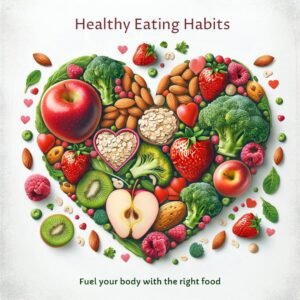Vitamin B12: The Vital Nutrient
Introduction
Vitamin B12, also known as cobalamin, is a water-soluble vitamin that is extremely important for many physiological processes. It is one of the eight essential B vitamins required for maintaining overall health and well-being. The functions and significance of this vitamin are quite significant, and it is worth exploring them in detail.
Sources of Vitamin B12
- Dietary Sources: Vit B12 is naturally present in certain foods. Animal-based foods like meat, fish, eggs, and dairy products are rich sources. Plant-based foods typically lack vit B12 unless they are fortified.
- Supplements: Vit B12 supplements are available in various forms, including tablets, capsules, and injections.
- Prescription Medications: Healthcare providers may prescribe vit B12 injections in cases of severe deficiency.
Functions of Vitamin B12
- Nervous System Health: Did you know that Vit B12 plays a critical role in the central nervous system’s development, myelination, and proper functioning? It is an essential nutrient that helps keep our nervous system healthy and functioning optimally.
- Red Blood Cell Formation: Vit B12, also known as cobalamin, is an essential nutrient that plays a crucial role in producing healthy red blood cells in our body. These cells carry oxygen throughout the body, and their deficiency can lead to anaemia, characterised by fatigue, weakness, and shortness of breath. Therefore, consuming sufficient amounts of vit B12 through a balanced diet or supplements is crucial to prevent anaemia and maintain optimal health.

- DNA Synthesis: Vitamin B12 is an essential nutrient the human body requires to maintain healthy nerve cells, red blood cells, and DNA synthesis. It plays a crucial role in forming myelin, a fatty substance that covers and protects nerve fibres in the brain and spinal cord. Vit B12 deficiency can cause various health issues, including anaemia, fatigue, weakness, numbness, and tingling in the hands and feet. It also impacts cell growth and repair, making it vital for maintaining healthy skin, hair, and nails.
- Enzyme Cofactor: It acts as a cofactor for two enzymes:
- Methionine Synthase: Converts homocysteine to methionine, an essential amino acid.
- L-methylmalonyl-CoA Mutase: Involved in propionate metabolism (a short-chain fatty acid).
Absorption and Transport
- Vitamin B12 is bound to protein in food.
- In the stomach, it binds to haptocorrin.
- In the duodenum, digestive enzymes release it from haptocorrin.
- It then combines with intrinsic factors secreted by the stomach’s parietal cells.
- The resulting complex is absorbed in the distal ileum.
Assessing Vitamin B12 Status
- Serum or plasma Vit B12 levels are commonly measured.
- Laboratories define subnormal levels as <200 or 250 pg/mL (148 or 185 pmol/L).
Deficiency Risks
- Vegetarians and Vegans: Certain groups of people follow a vegetarian or vegan diet due to personal, ethical, or religious beliefs. However, these individuals may face a higher risk of nutrient deficiencies as their dietary choices limit the sources of certain essential nutrients such as protein, iron, vitamin B12, and omega-3 fatty acids.
This is particularly true for those following a strict vegan diet, as they avoid all animal products, including meat, eggs, dairy, and honey. As a result, they may need to pay extra attention to their dietary choices and consider dietary supplements to ensure they meet their nutritional needs.
- Aging Population: Absorption efficiency decreases with age.
- Gastrointestinal Disorders: Conditions affecting absorption can lead to deficiency.
- Pernicious Anemia: An autoimmune condition affecting intrinsic factor production.

Health Risks from Excessive Vitamin B12
- Excessive supplementation is generally safe, as excess is excreted in urine.
- Rare cases of hypersensitivity reactions have been reported.
Interactions with Medications
- Vitamin B12 may interact with certain medications. Consult a healthcare professional if you’re taking medications.
Conclusion
Vitamin B12 is a water-soluble vitamin crucial to maintaining overall health and well-being. It properly functions the brain, nervous system, and blood cells. The body cannot produce vitamin B12 alone, so it must be obtained through dietary sources or supplements.

A deficiency in this vitamin can lead to various health problems, including fatigue, weakness, depression, and memory loss. Therefore, it is essential to ensure that you meet your daily requirement of vitamin B12.
The recommended daily intake of vitamin B12 for adults is 2.4 micrograms. Animal-based foods such as meat, fish, and dairy products provide adequate vitamin B12. Vegetarians and vegans can obtain vitamin B12 from fortified foods such as cereals, plant-based milk, and nutritional yeast.
Maintaining optimal levels of vit B12 in your body is crucial to prevent deficiency and associated health problems. A balanced diet with vit B12-rich foods and regular health check-ups can help you achieve this goal. So, please prioritise your well-being and stay informed about the importance of vit B12 for your health.
For more detailed information, refer to the Health Professional Fact Sheet provided by the Office of Dietary Supplements.



